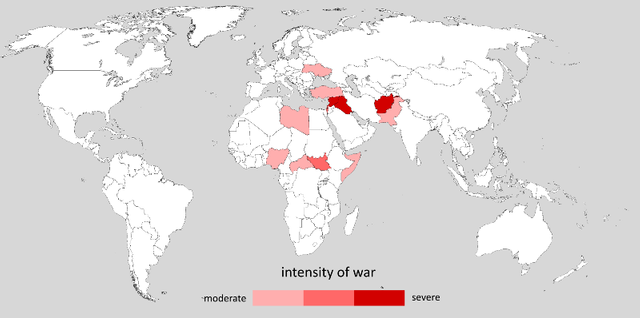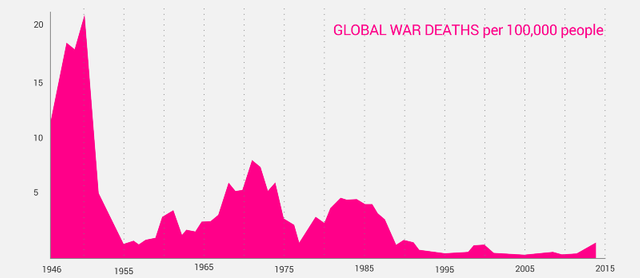
On Wednesday 21st June, the Colombian government agreed to a ceasefire with the country’s largest rebel group. For most people, this story would have passed unnoticed, buried amongst the headlines. That’s a pity. Not only does it mark the end of a 50 year old war that has killed more than 220,000 people, it also signals the end of official armed conflict in the entire western hemisphere of the planet. It means that all of the war in the world is now contained to an arc stretching from Nigeria to Pakistan, containing less than a sixth of the world’s population. If you can tear your attention away from the 24 hour news cycle, you’ll be astonished to hear that we are experiencing one of the least discussed, yet most remarkable cultural shifts of all time: war, one of our species’ most abiding and defining social practices, is at its lowest ebb ever.
The immediate reaction to a claim like that is of course, disbelief. The brutal conflict in Syria has claimed hundreds of thousands of lives, and displaced millions. We are in the midst of the largest refugee crisis of modern times, and terrorism is also at an all-time high. Every night our screens are saturated with images of hollowed out buildings in Fallujah and Aleppo, masked men flying black flags in the desert, and the faces of the latest innocent victims in Baghdad, Lagos, Paris, Brussels and Orlando.

But, as Joshua S. Goldstein and Steven Pinker point out in a recent Boston Globe editorial, our obsession with these stories blind us to a far greater truth. Outside the Middle East, war is effectively disappearing. In Nigeria, Boko Haram is on the retreat from many of its home terrories. In the Central African Republic, a newly elected government has brought genuine hope for lasting peace. In Ukraine, a shaky ceasefire is holding despite partial flare ups. We have short memories too. We forget about the civil wars that ended recently in Chad, Sudan, Peru, Iran, Sri Lanka, India and Angola and have forgotten earlier ones from a generation ago in places like Greece, Tibet, Algeria, Indonesia, Uganda, Ethiopia and Mozambique that killed millions of people.
The world was a far more dangerous place when you were born. Death tolls from wars in the 1970s and 1980s were 4–5 times higher than they are today. We are, despite reports of religious and political insurgencies, despite high-profile terrorist killings and unrest in various corners of the globe, living in the most peaceful era of our species’ existence. The world is getting less violent; we’re just more aware of the violence that happens, thanks to the mass availability of information. And unfortunately, the media and our politicians use that information to make it look as though we’re doing worse than we actually are. I’ve written about that elsewhere, so I won’t get into it into much detail. Suffice to say we have some evolutionary hangovers that leave us ill equipped to think about this stuff properly.
So what’s happening here? Why is war declining? Well the answer is complicated, but a big part of it seems to be that our institutions are getting better. After centuries of hard earned lessons, people are starting to understand that governance really matters. Democracy is more prevalent today than ever before (and despite all its obvious flaws, it’s still a hell of a lot better than authoritarianism and feudal serfdom). Since democracies don’t usually go to war with each other, the likelihood of interstate war, which kills more people than the kinds of intermittent, non-state conflicts we see today, is declining. As the world becomes more interconnected, the powerful have ever more incentives to avoid the catastrophic economic consequences of going to war too. Conflict isn’t good for your economy in a world of increased trade, digital flows and growing interconnectedness.

It feels strange, almost perverse to be celebrating this stuff when we know hundreds of thousands of people are still suffering in the Middle East and when millions of displaced people are being shunned by countries that are turning their backs on the principles they agreed to in the UN’s Refugee Convention. Our work is only just beginning. As war declines, we have an opportunity to turn our collective efforts to overcoming other forms of violence such as domestic abuse, slavery, and racial, political and religious persecution. As we are all too aware, we’ve got a long way to go: from state collapse in Venezuela and persecution in Tibet, to drug wars in Mexico and Brazil, and the rise of far-right extremism in Europe.
But, as one of my favourite statisticians Hans Rosling says — you have to be able to hold two ideas in your head at once. The world is getting better. But the world is not yet good enough. It’s important to acknowledge one of the great stories of our time. We are very lucky. Fewer of us as a proportion of the world’s entire population have had to go to war than any other generation since the Roman Empire. Surely that’s something that should be celebrated as part of our public discourse? When we speak about the decline of war, we have an opportunity to express our gratitude to those who came before us, and sacrificed so much for the principles of peace, and freedom from persecution. Our relative comfort and wellbeing is a direct result of their sacrifices — and by saying that the world is getting worse, we dishonour their memories. War is not inevitable. Many brave people have fought for that belief. Our generation is starting to show that it’s possible. And the more people start understanding that, the sooner it becomes a reality.
Hi! I am a content-detection robot. This post is to help manual curators; I have NOT flagged you.
Here is similar content:
https://medium.com/@angushervey/the-decline-of-war-8760f9a5b5ce
Downvoting a post can decrease pending rewards and make it less visible. Common reasons:
Submit